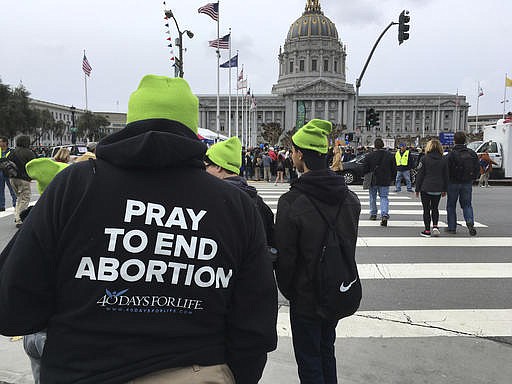NEW YORK-The collapse of the Republican health care overhaul was a sharp setback for anti-abortion leaders, whose hopes of halting federal funding to Planned Parenthood were derailed. But they continue to pursue that goal and also are pushing for a federal ban on most abortions after 20 weeks of pregnancy.
David O'Steen, executive director of the National Right to Life Committee, acknowledged the mood of disappointment in the anti-abortion movement after last week's drama in the House of Representatives, when GOP leaders withdrew their health care bill before a vote. The measure would have cut off more than $400 million in Medicaid reimbursements and other federal funding to Planned Parenthood for its non-abortion services.
However, O'Steen said his organization and its allies remained hopeful of future victories in Congress.
"This was one vote on one measure," he said. "We have pro-life leadership in both houses, we have a pro-life administration. So I expect some good things to help save lives still will happen."
Kristi Hamrick of Americans United for Life said the task of halting all federal funding for Planned Parenthood is more complicated than some activists suggest, because there are multiple funding streams-including family-planning funding and grants for sex education as well as Medicaid payments.
"We have to go after those one at a time," Hamrick said. "There's not going to be just one effort."
She suggested that the goal of defunding might not be achieved this year, but making the effort-and escalating attacks on Planned Parenthood for its abortion services-"lays the groundwork for what comes next."
Other abortion opponents say it's crucial to move quickly.
In a commentary this week, conservative activist Frank Cannon wrote that it would be "an absolute disaster" if the GOP-led Congress, facing a deadline at the end of April, sent President Donald Trump a government spending bill that maintained funding for Planned Parenthood.
"It would amount to a stunning betrayal that conservatives would be unlikely to forgive," Cannon wrote for the National Pulse. "We have one chance to get this done this year, and it has to happen now."
However, House Speaker Paul Ryan said the government-wide funding bill should not get entangled in the Planned Parenthood debate. Rather, Ryan said, the defunding proposal should be included in any new effort to repeal the Affordable Care Act-an effort that could flounder by rekindling internal GOP divisions.
Whatever the strategy, anti-abortion activists agree that defunding needs to be part of the budget-related process known as reconciliation, which enables bills to pass the Senate with only 51 votes. Under normal procedures, bills can be blocked by filibuster unless they have 60 votes in support.
That 60-vote threshold could prove fatal to the proposed 20-week abortion ban if it clears the House, as its backers hope, and then reaches the Senate. If Senate Democrats mostly hold their ranks, the bill would fail.
But Marilyn Musgrave, a former GOP congresswoman from Colorado who is now vice president of government affairs for the anti-abortion Susan B. Anthony List, said it would "smart politics" to get both the ban and the Planned Parenthood defunding proposal into the Senate. Votes on those issues, she said, might be challenging for Democrats who will be running for re-election next year in states won by Trump, such as Joe Manchin of West Virginia, Heidi Heitkamp of North Dakota and Joe Donnelly of Indiana.
As for Trump, Musgrave said she was confident he would stick by his promises to sign anti-abortion bills if they reach his desk.
"He's given commitments to the pro-life community and I believe he'll keep every one of them," she said.
Planned Parenthood strongly disputes the claim that attacks on it are smart politics.
"This fight isn't over yet, but remember that three-quarters of Americans support Planned Parenthood," said Dawn Laguens, the organization's executive vice president.
One out of five U.S. women have received services from Planned Parenthood, Laguens said, "and each time politicians in D.C. try to take that away, they will be drowned out by the millions of women and men across America who oppose these attacks."
Rep. Diana DeGette, a Colorado Democrat who staunchly supports abortion rights, said she's like to see the two sides in the abortion debate reach common ground on reducing unintended pregnancies. But the National Right to Life Committee and Americans United for Life say birth control is not part of their mission.
As for the Republicans' measures to defund Planned Parenthood and ban late-term abortions, DeGette said they might advance through the House but would likely die in the Senate.
"They're going to keep trying but I don't think they'll have any more success than they've had in the past," she said.

